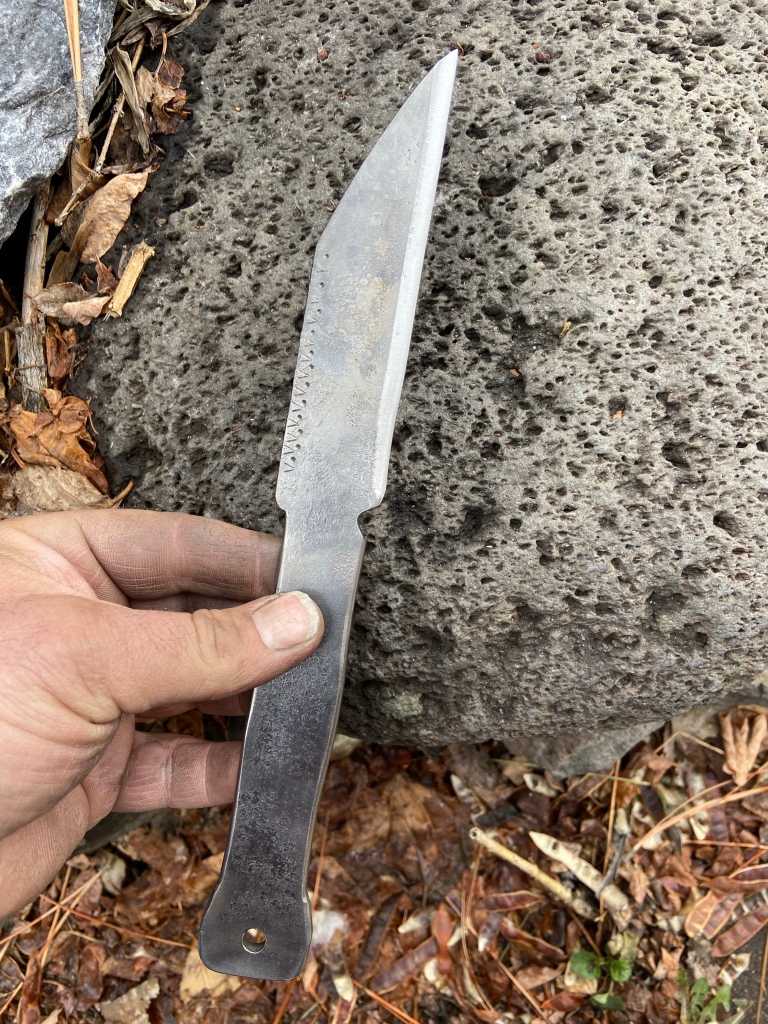Dithmarschen Mjönir
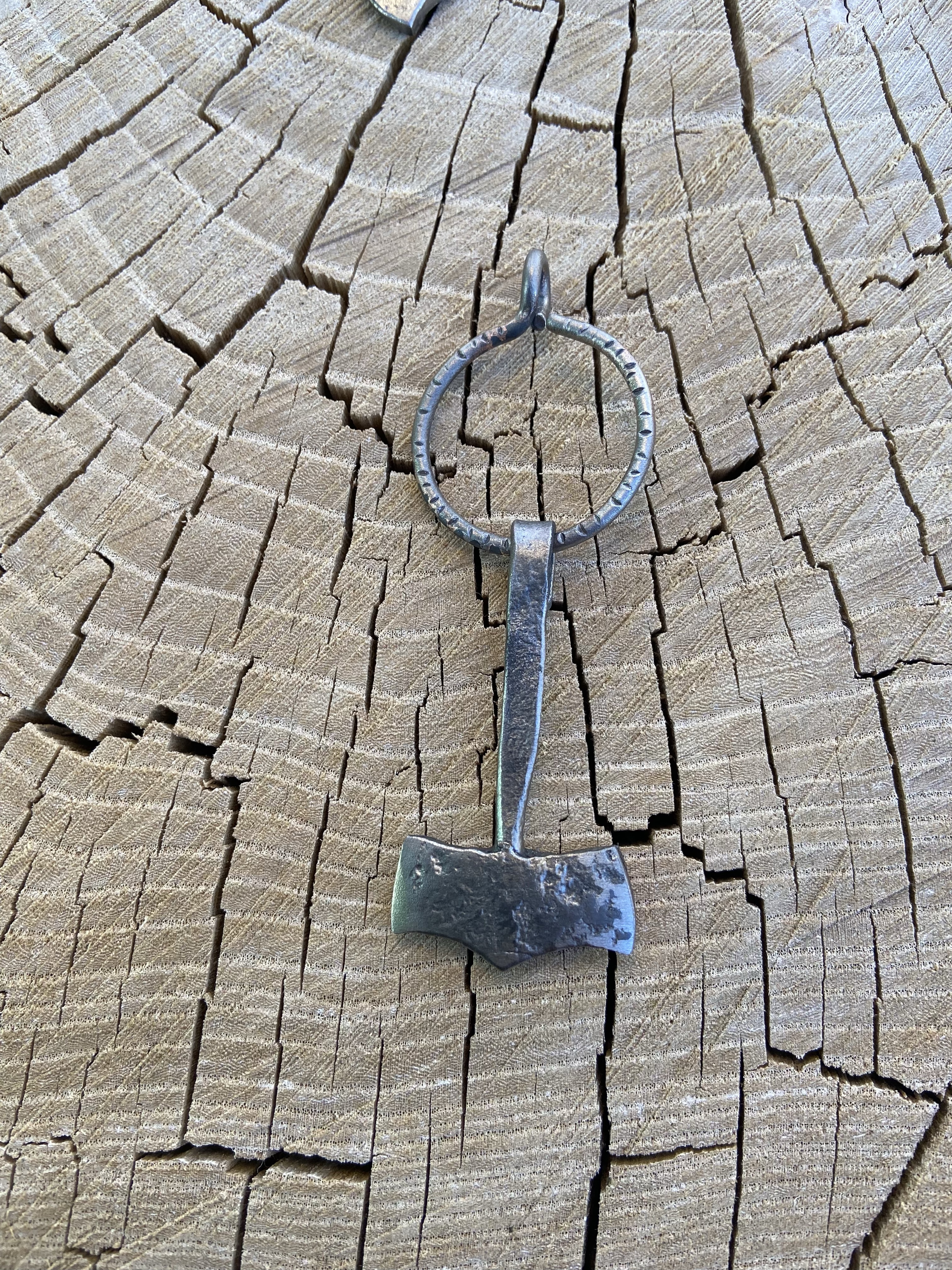
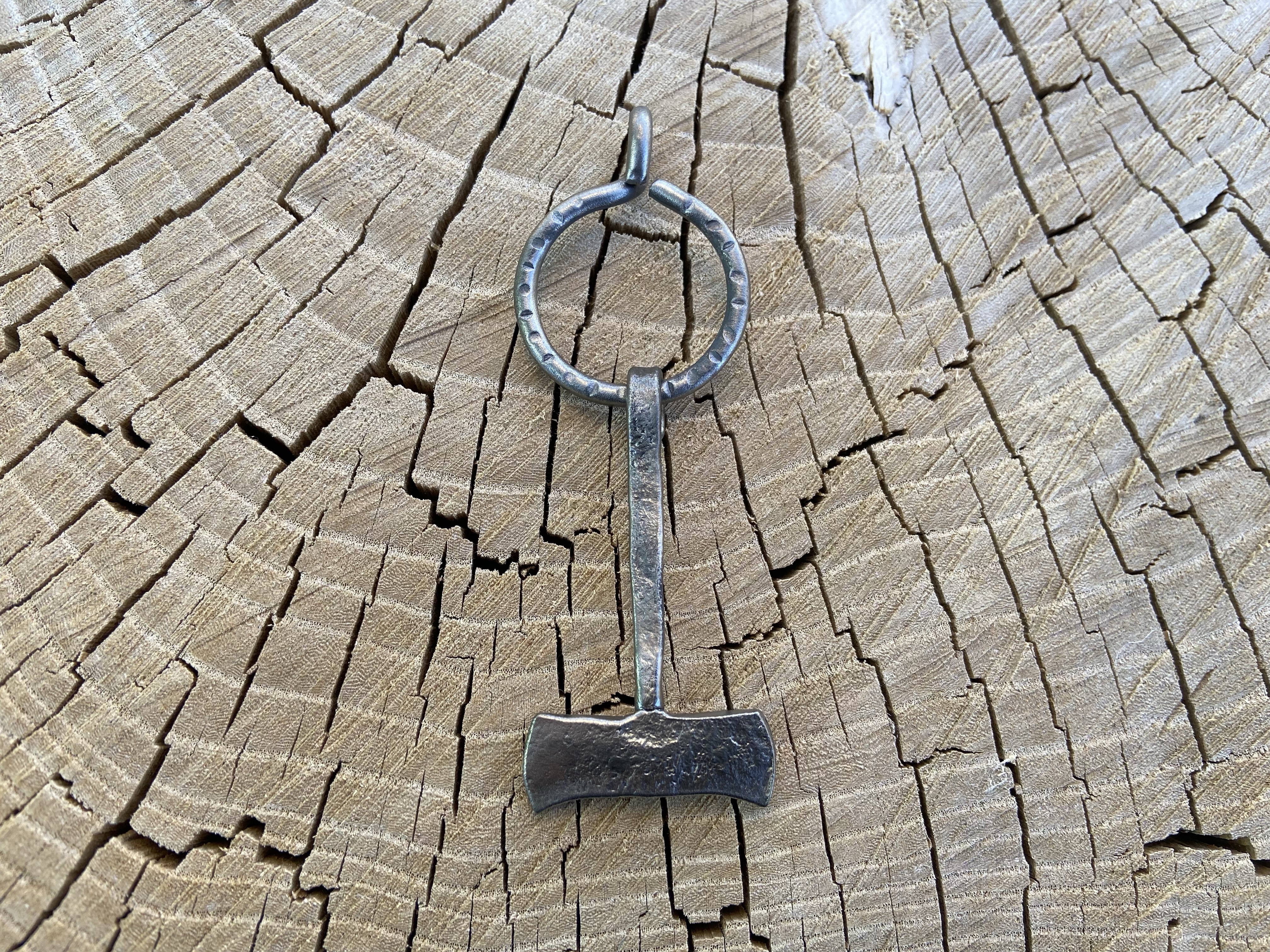
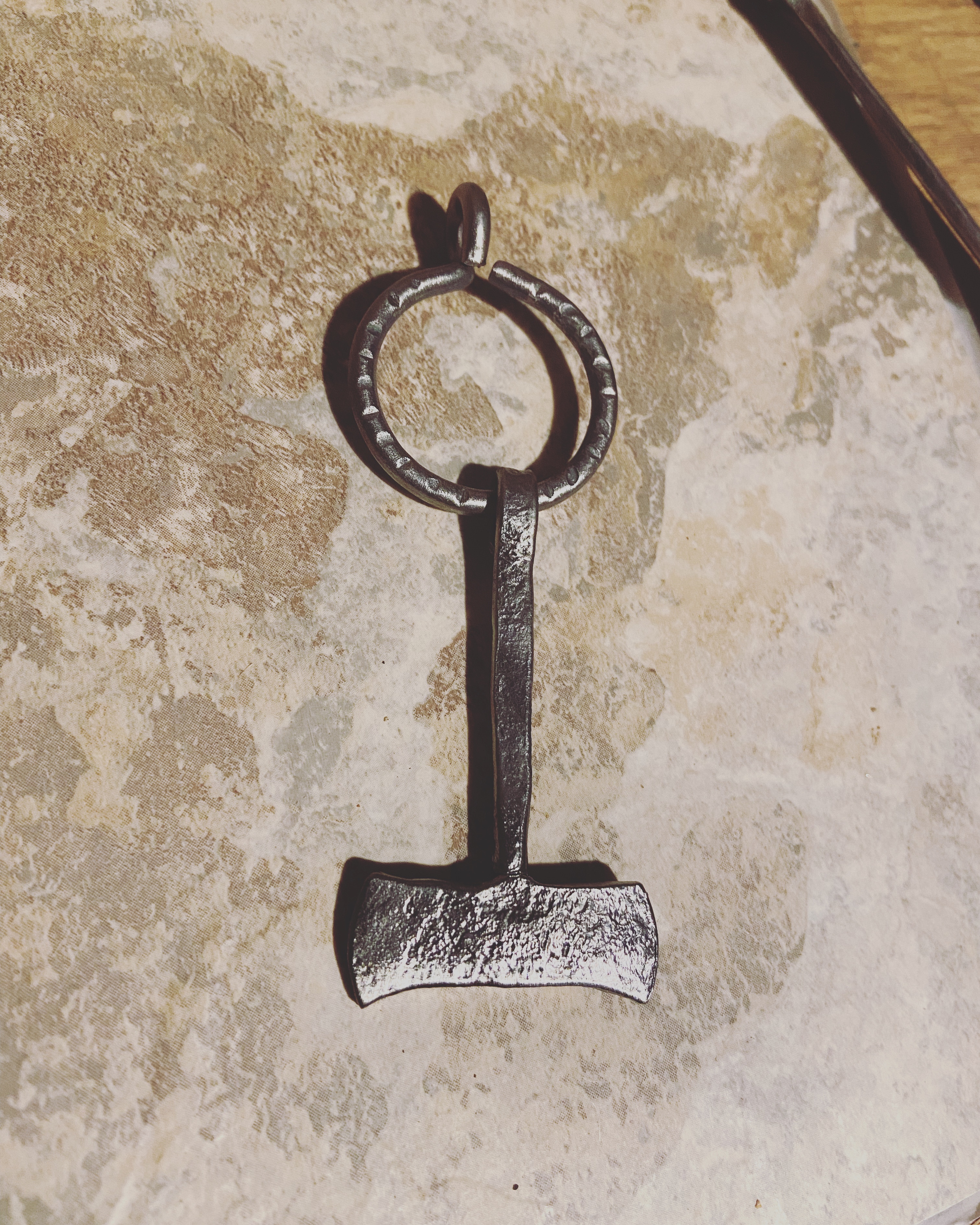
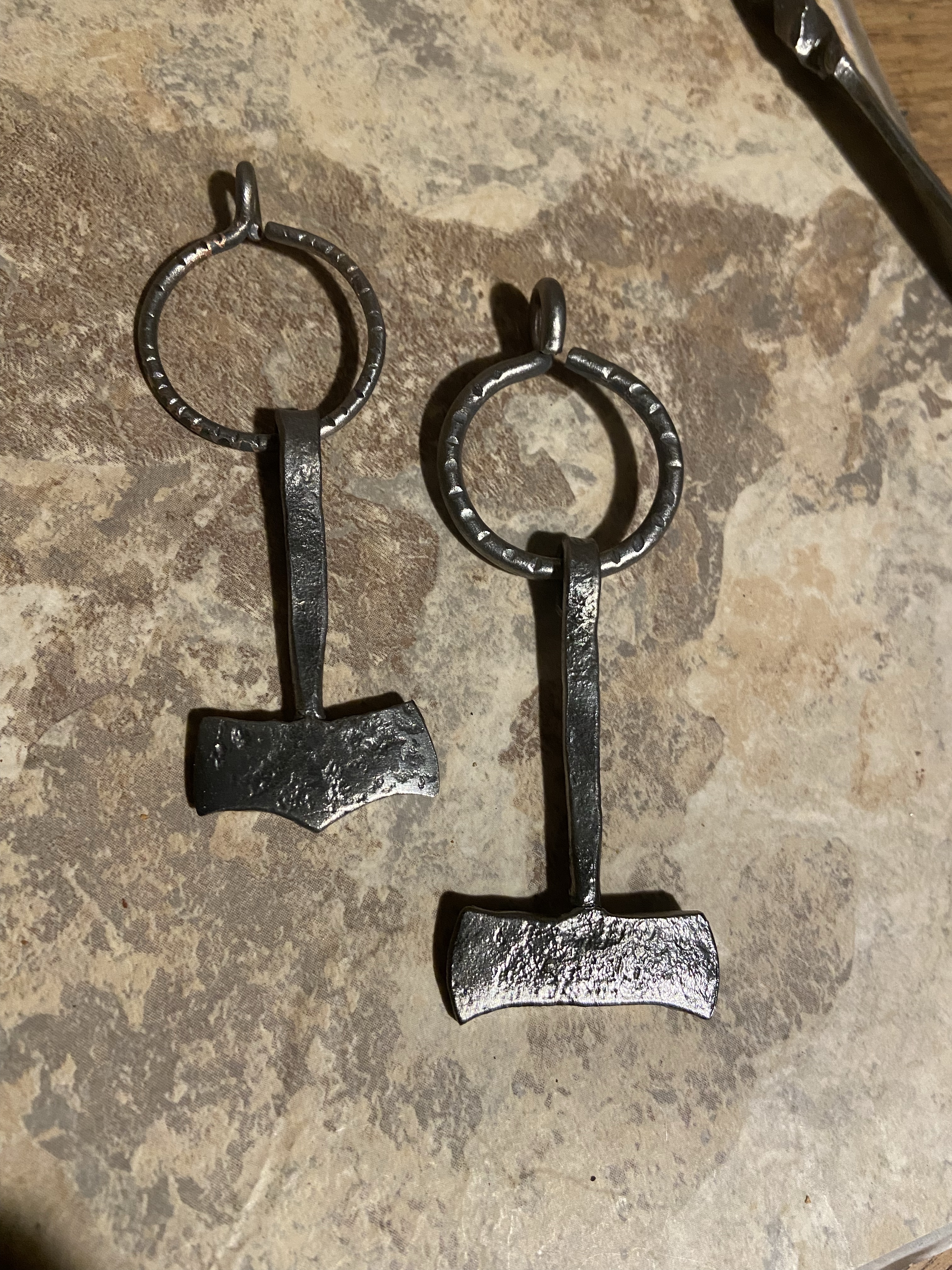
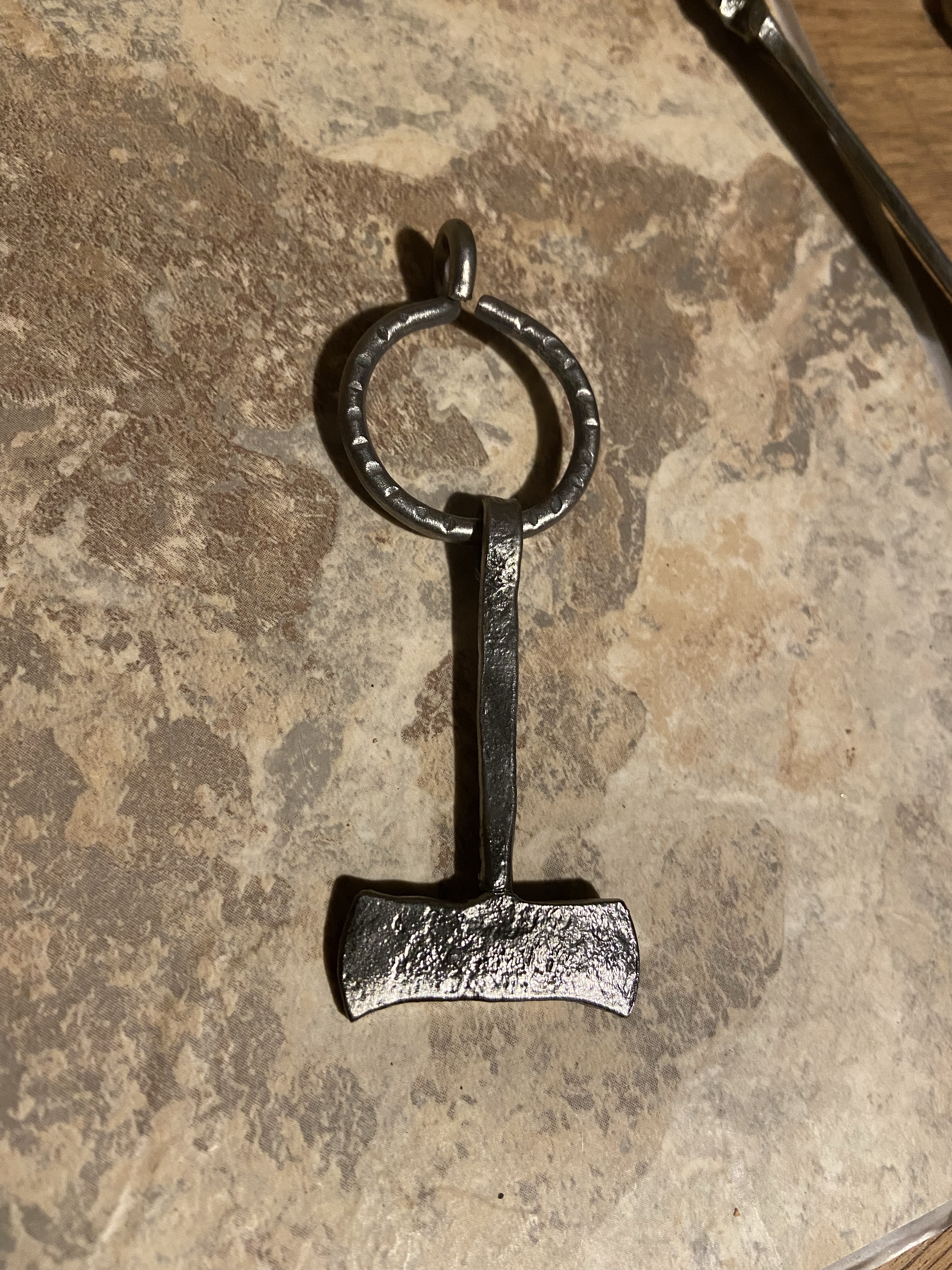
Hroð-
Etsy back up.
https://www.etsy.com/shop/NorseWest
After forever the forge is back in action. Trying to find a trip to Denmark/Germany. no customs just what is on here is available for now. Not back to knives yet. Hammer arm is a bit rusty yet.

Skål.
Hröð-
Jul

My Jul Will be between 12/21 and 1/18 so Glædelig Jul again & godt nytår.
Frohe Weihnachten und ein glückliches Neues Jahr.
Hröð-
Anglo Saxon grammar ideas
Anglo Saxon grammatical ideas and dative in semi poetic use:
The AS language retains the archaic Indo-European function of cases and gender as well as complicated poetic grammar that uses cases to imply words that are not actually written. In modern Germanic language only German and Icelandic retain cases and gender in any heavy use. Swedish and Danish have Common and Neuter in modern use. Danish and Old English share sometimes a visually close vocabulary but many are false friends and mean something different. AS uses cases not word order to indicate grammar and is more free in word order. This does not mean it is totally free or random in word order.
(The genders are meaningless in function in AS and only serve as a complicated archaic hold over from Proto Germanic and act as another layer of things to memorize. My interpretation from “Robert E Diamond” Old English grammar/ reader).
The following is my own writing of what I have learned.
The dative:
“Hail to the Sun”
The sun is receiving the call so it is singular dative.
I am the one hailing so I am in nominative.
Hælu Þære Sunnan (hail the sun) “to” is implied when using the dative and technically so is “the” so you could write it “Hælu Sunnan” and “ to the” ís implied and would be understood as such. The ending “an” on the Goddess name Sunne denotes a weak declension of the feminine noun. “Þære” ís the feminine dative form of “the” the nominative (f) form of the is “Seo”. Male Form(n) “Se” which is close to PG and PIE sources.
To add a personal emphasis I could add “Ic”
“Ic Hælu Þære Sunnan”
“I hail the sun”
As you can see Ic is cognate to German Ich.
When using articles (words like “the”) the article must match the gender of the word and the articles case must match the case being used. Dative with dative etc…
Example: masculine:
Se (nom) Hund (nom)
“The Dog” the dog is the subject so it is nominative as is “the”
Se Hundas (Nom/Plural)
“The dogs” plural
Þæs Hundes bān (Genitive)
“The dog’s bone”
(Accusative uses the same word endings as nominative) but uses several different articles depending on gender such as “þone”. The ACC case is used to denote the object being given such as above “bān”. In the modern sentence “I gave the dog a treat” the “treat” is accusative the dog is singular dative. The accusative is also used to indicate movement of something in a sentence such as running, riding, charging etc..
The dative case has the most uses and is the most complicated.
Dative:
“To the Hall” as in a toast
Sæle (neut) (tó the hall) poetic
“To the halls” “ (of our forebears) plural toast
Sælum (neut) dative plural “ to the” ís implied.
Sæl is the origin of the Word Saloon and Salon. Modern Danish “Sal” as in Mjødsal (Mead hall) Old English “Medusæl”
All cases and genders have a version of the word “the” and some are shared. Cases have some of the following endings: ( not complete or exhaustive)
E
A
es
as
U
an
Some case endings on certain words have no end vowel or sometimes use a double from another such as sometimes genitive ending E or Nominative ending in A.
This level of complexity leaves the student with need of complex tables showing all gender forms, articles by case and gender as well as all singular and plural forms of words. Wiktionary and and a good word hoard book goes a long way.
Notes:
Anglo Saxon is a Norð Sea Germamic or Ingveonic language that originated in Jutland and Southern Scandinavia. Old English, English, Old Saxon, Low German, Old Frisian and Frisian are all within the Ingveonic family. Some speculate the Teutons were also Ingveonic due to their southern Scandinavian origin. These languages sit somewhere between Scandinavian and West Germanic languages.
I use Peter S. Baker, Robert E Diamond and Stephen Pollington, K Herbert resources as well Thijs Porck videos and wiktionary declension tables.
Skål 🍻 some of this might not correct but it’s as far as I have gotten.
Hroð-
Anglo Saxon word of the day: acweorna
Anglo Saxon word of the day:
ācweorna (squirrel)
The first denotes “oak” the second element “weorna “ denotes squirrel.
Proto-West Germanic: *aikwernō
Old English: ācweorna
Middle English: acquerne
Old Frisian: *ēkworna, *ēkhorna
Saterland Frisian: *Eeker (in Kateeker ?)
West Frisian: iikhoarn, iikhoarntsje
Old Saxon: *ēkhorno
Middle Low German: êkhōrn, êkhōrne, eikhōrne, êkhorn, êkōrn, eikōrn, êkōrne, echhorne
⇒ Dutch Low Saxon: Eekhoorntje
German Low German: Ekkern
Westphalian:
Ravensbergisch: Aik, Aikern
Sauerländisch: Ēksken, Aikerte
⇒ German Low German: Eekhoorntje
Old Dutch: *ēcorno
Middle Dutch: êencōren
Dutch: eekhoorn
Old High German: eihhorno, eihhurno
Middle High German: eichurne
Alemannic German: Eichhore
German: Eichhorn
⇒ German: Eichhörnchen
⇒ Hunsrik: Eichhernche
Old Norse: íkorni
Icelandic: íkorni
Faroese: íkorni
Norwegian:
Norwegian Bokmål: ekorn
Norwegian Nynorsk: ekorn, ikorn
Old Swedish: ēkorne, īkorne
Swedish: ekorre, (dialectal) ikorn
Old Danish: īkærnæ
Danish: egern
Westrobothnian: ickȯrn, ikårn, ikkårn
Elfdalian: aikuonn
Jamtish: íkuðn
Gutnish: eikånn
Scanian: igarne
Bonus:
maniġfeald (manifold, many fold, of many parts)
Old English: maniġfeald, mæniġfeald
Middle English: manifald, monifald, manyfold, manifold
English: manifold, manyfold
Old Frisian: manichfald
Old Saxon: managfald
Old Dutch: *manigfald
Middle Dutch: menichvout
Dutch: menigvoud, menigvoudig
Old High German: manicfalt, manicfaltīg
Middle High German: manecvalt, manecvaltec
German: mannigfaltig
Old Norse: margfaldr
Icelandic: margfaldur
Norwegian: mangfoldig
Old Swedish: mangfalder
Swedish: mångfald, mångfaldig
Danish: mangefold
Gutnish: manggfaldur
Gothic: 𐌼𐌰𐌽𐌰𐌲𐍆𐌰𐌻𐌸𐍃 (managfalþs)
Hröð-
Anglo Saxon word of the day: Preowthwil
Anglo Saxon word of the day:
prēowthwīl (to blink) (the time it takes to blink)
Bonus 1:
Hagosteald (an unmarried warrior of royal descent) (bachelor)( liegeman) (owner or one who lives on fenced land of their family) sometimes acts as a personal name. Alternate:Hægsteald.
Old English: hæġsteald, hagulstead, hagosteald
⇒ Old English: Hagustealdesēa
⇒ Old English: Hagustealdeshām
English: Hexham
Middle English: hassel, haselle
Old Saxon: hagalstad
Old High German: hagalstalt, hagastolt
Old Norse: haukstalda
Bonus 2:
wīġbǣre (warlike) (eager for battle)
Hroð-
Anglo Saxon word of the day: Tirgan.
Anglo Saxon word of þe dæg:
Tirġan (ᛏᛁᚱᚷᚨᚾ) ( to provoke, pain, irritate)
Old English: tergan, tiergan, tyrgan, tirgan, tirian; tierwan
Middle English: terien, tarien, taryen; terȝen
Scots: tarrow
English: tarry
Old Frisian: *tergia
West Frisian: tergje
Old Saxon: *targian, *tergian
Middle Low German: tergen, targen
→ Danish: tærge
→ Norwegian: terge
→ Swedish: targa
Old Dutch: *tergen
Middle Dutch: tergen, terghen
Dutch: tergen
Old High German: *zergen
Middle High German: zergen
German: zergen
Bonus:
Torht ( to shine, brightness)
Old English: torht
Middle English: torhte, tohte
Old Saxon: torht, toroht
Old High German: zorht, zoraht, zorft
Hroð-
Anglo Saxon word of the day: Uhta
Anglo Saxon word of þe dæg:
ūhta (pre dawn) (last part of night)
Old English: ūht (< *unhtwaz), ūhta (< *unhtwô)
Middle English: *uht (found in compound uhtsang, uhtsong); Middle English: uhhtenn, uȝten, ughten, oughten (< Old English ūhtan, oblique form)
Old Saxon: ūhta
Middle Low German: uchte
German Low German: Uchte, Ucht
→ German: Uchte (“midnight mass”) (regional)
Old Dutch: *ūhto
Middle Dutch: uchte, ochte (various forms are attested, including nuchte through rebracketing, uchten/ochten from the case forms, and rarely uchtent/ochtent from the previous by analogy with avont (“evening”))
Dutch: ochtend
Old High German: uohta (irregular); *ūhta
Middle High German: uohte, ūhte (both rare)
German: Ucht, Aucht (both only in placenames and compounds)
Old Norse: ótta
Icelandic: ótta
Norwegian Bokmål: otte
Westrobothnian: ótt’
Old Swedish: ōtta, ōta
Swedish: otte, otta
Danish: otte
Gothic: 𐌿𐌷𐍄𐍅𐍉 (ūhtwō)
Bonus:
Lagustrǣt (ocean) literally “Water-road”.
Old English: strǣt, strēt
Middle English: strete, streete, stret, strate, street, stræt
English: street
Scots: street, streit, stret
→ Breton: straed
→ Cornish: stret
→ Welsh: stryd
→ Old Irish: sráit (see there for further descendants)
→ Old Norse: stræti (see there for further descendants)
Old Frisian: strēte
North Frisian:
Föhr-Amrum: struat
Mooring: stroote
Saterland Frisian: Sträite
West Frisian: strjitte
Old Saxon: strāta
Middle Low German: strâte
German Low German: Straat, Stroot
Old Dutch: strāta
Middle Dutch: strâte
Dutch: straat (see there for further descendants)
Limburgish: sjtraot, straot
Old High German: strāza
Middle High German: strāze
Alemannic German:
Swabian: Schdrôs
Bavarian: Stråßn, Strossn
Apeltonerisch: Streoss
Mòcheno: stros
Upper Bavarian: Straß
Central Franconian: Stroß
Eifel: Strooß
Hunsrik: Stros
Luxembourgish: Strooss
German: Straße
Rhine Franconian: Schdrooß
And
West Germanic: *lagu
Old English: lagu, lago
Middle English: laȝe, lawe, laie, leye
English: lay
Old Saxon: lagu
Old Norse: lǫgr
Icelandic: lögur
Faroese: løgur
Norwegian Nynorsk: log
Norwegian Bokmål: låg
Old Swedish: lagher
Swedish: lag
Old Danish: low, lou
→ Scots: lyog
Gothic: *𐌻𐌰𐌲𐌿𐍃 (*lagus) (> 𐌻𐌰𐌰𐌶 (laaz))
Hroð-
Book of the month (June)

Hilda Roderick Ellis Davidson is quickly becoming a favorite author of mine. Great detail and everything kept in context. I do love comparatives though I am biased.
Hrøð-
Anglo-Saxon Word of þe dæg: Cunnende
Anglo-Saxon Word of þe dæg:
ᚪᚾᚷᛚᚩ ᛋᚪᛉᚩᚾ ᚹᚩᚱᛞ ᚩᚠ ᚦᛖ ᛞᚫᚷ᛫
Cunnende (present participle of Cunnan) ( cunning,clever,crafty,cute) from Proto Germanic “kunnana”. ᚳᚢᚾᚾᛖᚾᛞᚪ᛫
Compare:
West Germanic: *kunnan
Old English: cunnan
Middle English: cunnen, connen, can
Scots: can, cun, cunning
English: can, con, cun, could, cunning, canny
Old Frisian: kunna
North Frisian:
Föhr-Amrum: kön
Hallig: kune
Helgoland: kan
Mooring: koone
Sylt: ken
Saterland Frisian: konne
West Frisian: kinne
Old Saxon: kunnan
Middle Low German: künnen, kynnen, kunnen, konnen, können, kȫnen, konen
Low German: könen
Plautdietsch: kjanen
Old Dutch: cunnan
Middle Dutch: connen
Dutch: kunnen
Limburgish: kónne
West Flemish: keunn
Old High German: kunnan
Middle High German: kunnen, künnen
Alemannic German: chöne, chönne
Swabian: kenna
Sathmar Swabian: kenne
Central Franconian: kenne, könne, künne
East Central German:
Erzgebirgisch: kènn
Upper Saxon: gönn
German: können
Luxembourgish: kënnen
Rhine Franconian:
Pennsylvania German: kenne
Vilamovian: kenna
Old Norse: kunna
Icelandic: kunna
Faroese: kunna
Norwegian:
Norwegian Bokmål: kunne
Norwegian Nynorsk: kunne, kunna
Old Swedish: kunna
Swedish: kunna
Old Danish: kunnæ
Danish: kunne
Elfdalian: kunna
Gutnish: kunne
Gothic: 𐌺𐌿𐌽𐌽𐌰𐌽 (kunnan)
————————-
Bonus:
Prættig (pretty, cute, cunning) from Proto Germanic “Prattugaz”. ᛈᚱᚫᛏᚷ᛫
Compare:
Old English: prættiġ, prætiġ, pætiġ, petiġ
Middle English: prati, prety
Scots: pratty, ill-pretty, prety
English: pretty, pratty
Old Frisian: *pratig, *pretig
Saterland Frisian: prettig
Old Saxon: *prattig
Middle Low German: prattich
Low German: pratzig
Old Dutch: *prattig
Middle Dutch: *prattig, *prettig
Dutch: prettig
Old Norse: prettugr
Icelandic: prettugur
——————-
Anglo-Saxon Word of þe dæg: Wynn-Wyn
Anglo-Saxon Word of þe dæg:
ᚪᚾᚷᛚᚩ ᛋᚪᛉᚩᚾ ᚹᚩᚱᛞ ᚩᚠ ᚦᛖ ᛞᚫᚷ᛫
Wynn (joy, delight) Rune “ᚹ” (wyn) From Proto Germanic “Wunjo). ᚹᛄᚾᚾ᛫
Compare:
West Germanic: *wunnju
Old English: wynn, wyn
Middle English: wynne, wunne, winne
English: wynn, wen, winne, win
Scots: win
Old Saxon: wunnia
Middle Low German: wunne
Low German: Wünn
Old Dutch: *wunna, *winna (attested in winnemānōth)
Middle Dutch: wonne
Dutch: wonne
Old High German: wunnja, wunna, wunnī
Middle High German: wunne, wünne
German: Wonne
Old Norse: ynði, yndi
Icelandic: yndi
Faroese: yndi
Norwegian: ynde
Danish: ynde
—————
Bonus:
Hosan (pants, trousers, tights, leggings) cognate to German “hosen”. ᚻᚩᛋᚪᚾ᛫
Compare:
West Germanic: *hosā
Old English: hose, hosa, hosu
Middle English: hose, hoyse, hosa, hoose
English: hose
Scots: hose, hoe
Old Frisian: *hose
Saterland Frisian: Hoose
West Frisian: hoas
Old Saxon: hosa
Middle Low German: hōse, hāse
German Low German: Hose, Hoos
Old Dutch: *hosa
Middle Dutch: hōse
Dutch: hoos
Old High German: hosa
Middle High German: hose
Cimbrian: hóoza
German: Hose
Luxembourgish:hues
Old Norse: hosa
Icelandic: hosa
Faroese: hosa
Norwegian: hose
Old Swedish: hosa, husa
Swedish: hosa
Danish: hose
Gothic: 𐌷𐌿𐍃𐌰 (husa)
Hroðberht-
Rune of þe dæġ: (Mann)
Rune of þe dæġ:
Mann: ᛗ᛬ Modern ‘M”. Elder “Mannaz”.
(Man, Humanity, The Self)
Anglo Saxon Rune Poem:
ᛗ Man byþ on myrgþe his magan leof:
sceal þeah anra gehƿylc oðrum sƿican,
forðum drihten ƿyle dome sine
þæt earme flæsc eorþan betæcan.
The joyous man is dear to his kinsmen;
yet every man is doomed to fail his fellow,
since the Lord by his decree will commit the vile carrion to the earth.

Hroðberht-
6/26/20.
Anglo Saxon word of þe dæg: (Willan)
Anglo Saxon word of þe dæg:
ᚪᚾᚷᛚᚩ ᛋᚪᛉᚩᚾ ᚹᚩᚱᛞ ᚩᚠ ᚦᛖ ᛞᚫᚷ᛫
Willan (infinitive) (to will, want, desire, intend) Wille “1st person singular indicative” (will) From Proto Germanic “wiljana”. ᚹᛁᛚᛚᚪᚾ᛫ᚹᛁᛚᛚᛖ᛫ The concept of will within Germanic spirituality is reduced to the God Woden who best represents the transformational power of the will and inherent strength and advantage to one with a strong will. By his will he withstood torture , starvation and death to reach down in madness and grasp the Runes from the yawning void. ᛁᚳᚻ ᚹᛖᛞᛖ᛫
Example:
Iċ wolde þæt dōn!
I meant to do that!
———
Ne breġd þū nǣfre þīn sweord būtan þū his notian “wille”.
Never draw your sword unless you “intend” to use it.
—————-
Compare:
West Germanic: *willjan
Old English: willan, wyllan
Middle English: willen, wil, wille, wilen, welin, wole, wolle
English: will
Scots: will, wil
Old Frisian: willa, wella
North Frisian:
Föhr-Amrum, Sylt: wel
Mooring: wale
Saterland Frisian: wolle
West Frisian: wolle
Old Saxon: willian
Middle Low German: willen, wellen
Low German: wüllen
Old Dutch: willen
Middle Dutch: willen
Dutch: willen
Limburgish: wille
Old High German: wellen, wollen (conflated with *waljaną)
Middle High German: wellen, wollen
Alemannic German: welle, wella, wölla
Swabian: wella
Bavarian: woian
Apetlonerisch: walln
Cimbrian: bölln, béllan
Central Franconian: welle
German: wollen
German: werde
Luxembourgish: wëllen
Rhine Franconian:
Pennsylvania German: wolle
Old Norse: vilja
Icelandic: vilja
Faroese: vilja
Norwegian: ville, vilje
Old Swedish: vilia
Swedish: vilja
Old Danish: willæ
Danish: ville
Westrobothnian: vili
Elfdalian: wila
Jamtish: vili
Gutnish: ville, vila
Scanian: villa
Gothic: 𐍅𐌹𐌻𐌾𐌰𐌽 (wiljan)
——————-
Bonus:
Stǣlwierþe (stalworth, stalwart) our modern spelling is directly from a Scots influence on Middle English (stalwart). Scots is a Northern dialect of English spoken in Scotland. A Compound of words meaning a person of good standing, hardy, robust, strong, steadfast.
stǣlƿierþe (Wynn spelling)
—————————-
Hroðbeorht-
Anglo-Saxon word of þe dæg: (Midsumermonaþ)
Anglo-Saxon word of þe dæg:
ᚪᚾᚷᛚᚩ ᛋᚪᛉᚩᚾ ᚹᚩᚱᛞ ᚩᚠ ᚦᛖ ᛞᚫᚷ.
Midsumermonaþ (June) literally “Midsummer Month”. Proto Germanic “midjasumaraz” and “mānōþ”. ᛗᛁᛞᛋᚢᛗᛖᚱᛗᚩᚾᚪᚦ.
Compare:
Old English: *middesumor, midsumer, midsumor
Middle English: midsomer, midsumer
Scots: midsumer, midsomer, midsimer
English: midsummer
Old Frisian: midsumur
West Frisian: midsimmer
Old Saxon: *middisumar
Middle Low German: midsōmer, mitsōmer, mitsommer
Low German: Mitsömmer, Midsömmer
Old Dutch: *midsumar
Middle Dutch: midsomer
Dutch: midzomer
Old High German: *mittisumar
Middle High German: mittersumer
German: Mittsommer
Old Norse: miðsumar
Icelandic: miðsumar
Faroese: midsummar
Norwegian: midtsommer
Old Swedish: miþsumar, midhsomar
Swedish: midsommar
Danish: midsommer
Elfdalian: missåmår
Gutnish: missåmmar
————-
Bonus:
God( “God” a gender less word or description of a Deity or spirit) literally “Invoked One” from Proto Germanic “gudą”. Directly related to Proto Germanic “Gautaz” to pour or to create. This led to the name for Odin “Gautr” and later lent its way to the tribe known as The Goths “those From Gotland” or “The Geats”. The discriptive word “God” or “Goð” only became a masculine gendered word after a foreign religion began influencing Northern Europe. The word remained in use due to the fact the Anglo Saxons refused the foreign name therefore a native form had to be used. ᚷᚩᛞ᛫
————-
Midsummer night by Nikolai Astrup (Norway) 1926. Jonsokbål. (Public Domain/Wikipedia)

Hroðbeorht-
Anglo-Saxon word of þe dæg: (ōsle)
Anglo-Saxon word of þe dæg:
ᚪᚾᚷᛚᚩ ᛋᚪᛉᚩᚾ ᚹᚩᚱᛞ ᚩᚠ ᚦᛖ ᛞᚫᚷ᛫
ōsle (blackbird) from Proto Germanic “amslǭ” . ᚩᛋᛚᛖ᛫
Example:
Sēo wīflīċe ōsle ġetimbraþ nest þrēowa on ġēare.
The female blackbird builds a nest three times a year.
Compare:
West Germanic: *amslā
Old English: ōsle
Middle English: osel
Scots: osil
English: oozel, ousel, ouzel
Old Saxon: amsla
Middle Low German: amsel, amelse
German Low German: Amsel
Plautdietsch: Aumsel
→ English: amzel
Old High German: amsla, amasla, amsala, amusla, amisla
Middle High German: amsel
German: Amsel
——————
Bonus:
Bār (Boar) from Proto Germanic “Bairaz”. ᛒᚪᚱ.
Compare:
Old English: bār
Middle English: bar, bor
Scots: bair
English: boar
Old Frisian: *bār
West Frisian: bear
Old Saxon: bēr
Middle Low German: bêr
Low German: Behr (Osnabrückisch)
Old Dutch: *bēr; bēro
Middle Dutch: bere, beer
Dutch: beer (“boar”)
Old High German: bēr, pēr, pair
Middle High German: bēr
German: Bär (“boar”) (dialectal, obsolete outside compounds)
——————
Hroðbeorht-
Anglo-Saxon word of þe dæg:(Brim)
Anglo-Saxon word of þe dæg:(Brim)
ᚪᚾᚷᛚᚩ ᛋᚪᛉᚩᚾ ᚹᚩᚱᛞ ᚩᚠ ᚦᛖ ᛞᚫᚷ᛫
Brim (Ocean, Surf, Sea shore) (poetic) from Proto Germanic “Brimą”. ᛒᚱᛁᛗ᛫
Also: Brimlīþend (seafarer).
Compare:
Old English: brim
Middle English: brim
English: brim
Old Norse: brim
Icelandic: brim
Faroese: brim
…………..
Bonus:
Sēċan (seek, to seek) from Proto Germanic “sōkijaną” . ᛋᛖᚳᚪᚾ᛫
Example:
Hwæt sēcst þū?
What are you looking for?
Hē sōhte rǣd æt his fæder.
He sought advice from his father.
Se hwelp sēcþ þā wiermðe his mēder.
The cub seeks the warmth of its mother.
Compare:
West Germanic: *sōkijan
Old English: sēċan, sœ̄ċan, sēċean
Middle English: seken, sech, seche, secche, sheche, shechen, seichen, siech, sieche, siechen, siche, such, suche, sek, seke, ceken, seik, seike, sieke, sike
English: seek, seech (Lancashire and other dialects)
Scots: seek
Old Frisian: sēka
Saterland Frisian: säike
West Frisian: sykje
Old Saxon: sōkian
Middle Low German: sö̂ken
Low German: sooken, söken, seuken, säuken
Old Dutch: suoken
Middle Dutch: soeken
Dutch: zoeken
Limburgish: zeuke
Old High German: suohhen
Middle High German: suochen
Alemannic German: sueche, süeche
Alsatian: süacha
Bavarian: suacha
Cimbrian: züuchan
Luxembourgish: sichen
German: suchen
Rhine Franconian: suche
Frankfurterisch: [suɣ̥ə]
Old Norse: sœkja
Icelandic: sækja
Faroese: søkja
Norwegian:
Bokmål: søke
Nynorsk: søke, søka, søkje, søkja
Old Swedish: sø̄kia
Swedish: söka
Old Danish: søkia, søkæ
Danish: søge
Gothic: 𐍃𐍉𐌺𐌾𐌰𐌽 (sōkjan)
………..
Hroðbeorht-
Anglo Saxon word of þe dæg: (Hwisprian)
Anglo Saxon word of þe dæg:
ᚪᚾᚷᛚᚩ ᛋᚪᛉᚩᚾ ᚹᚩᚱᛞ ᚩᚠ ᚦᛖ ᛞᚫᚷ᛫
Hwisprian ( whisper) from Proto Germanic “hwisprōną”. ᚻᚹᛁᛋᛈᚱᛁᚪᚾ᛫
Compare:
Old English: hwisprian
Middle English: whisperen
English: whisper
Old Saxon: *hwisparon
Middle Low German: *wispern
German: wispern
……
Bonus:
Faran (go, to go, travel, journey, fare, to fare) also found in the “fare” in farewell. Far tō helle (go to hell) Far wel (farewell). ᚠᚪᚱᚪᚾ᛫
Compare:
West Germanic: *faran
Old English: faran, fearan, fara, færan, færa,
feran
Middle English: faren
English: fare
Scots: fare, fair
Old Frisian: fara
Saterland Frisian: foare
West Frisian: farre
Old Saxon: faran
Middle Low German: vāren
German Low German: fahren
Old Dutch: faran
Middle Dutch: vāren
Dutch: varen
Limburgish: vare
Old High German: faran
Middle High German: varen, varn
Alemannic German: faare, fare
German: fahren
Luxembourgish: fueren
Old Norse: fara
Icelandic: fara
Faroese: fara
Norwegian: fare, fara
Old Swedish: fara
Swedish: fara
Danish: fare
Westrobothnian: fera, fära, fɑra, fara, fåra
Elfdalian: fårå
Gothic: 𐍆𐌰𐍂𐌰𐌽 (faran)
………….
Hroðberht-
Anglo-Saxon wird of the þe dæg: Brōc
Anglo-Saxon wird of the þe dæg: Brōc
ᚪᚾᚷᛚᚩ ᛋᚪᛉᚩᚾ ᚹᚩᚱᛞ ᚩᚠ ᚦᛖ ᛞᚫᚷ᛫
Brōc (brook, stream) from Proto Germanic “brōkaz”. ᛒᚱᚩᚳ᛫
Compare:
Old English: brōc
Middle English: brook
English: brook
Scots: broke, bruke
Old Frisian: brōk
Saterland Frisian: Brouk
West Frisian: broek
Old Saxon: *brōk
Middle Low German: brôk
Low German:
German Low German: Brook
Ravensbergisch-Lippisch: Brüöke
Suerländer-Märkisch: Brüək
Westmünsterländisch: Bröcke
Plautdietsch: Broak
Old Dutch: bruoc, brōk (attested in placenames)
Middle Dutch: bruec, broec, brouc, brouck, broek
Dutch: broek
Old High German: bruoh
Middle High German: bruoch
German: Bruch
…………..
Bonus:
Rǣde (ready, prompt, prepared) from Proto Germanic “raidaz” ᚱᚫᛞᛖ᛫
Compare:
Old English: rǣde, ġerǣde
Middle English: rædi, rædiȝ, redi, redy, iredi
English: ready
Scots: readie, reddy
Old Frisian: rēd; rēde
North Frisian: ree
Saterland Frisian: reed
West Frisian: ree
Old Saxon: *girēdi
Middle Low German: gerêde, gerêt
Low German: rede, reed
Danish: rede
Old Swedish: rēþo
Swedish: redo
Old Dutch: *reid, *gereid
Middle Dutch: rede, reede, gerede, gereide, gereit, gereet
Dutch: reed, gereed
Old High German: reiti, gireit
Middle High German: gereite, gereit
Old High German: bireiti (< *biraidijaz)
Middle High German: bereite, bereit
German: bereit
Swedish: beredd
Old Norse: reiðr, greiðr; greiðliga
Icelandic: greiður
Faroese: reiður
Norwegian: reiug, grei, rede
Swedish: reda
Danish: rede
Middle English: greithe, greith, graith; greithli
Scots: graith; graithlie
English: graith; gradely
Gothic: 𐌲𐌰𐍂𐌰𐌹𐌸𐍃 (garaiþs)
…………..

Hroðberht-
Anglo-Saxon wird of the þe dæg: (Brōc)
Anglo-Saxon wird of the þe dæg: (Brōc)
ᚪᚾᚷᛚᚩ ᛋᚪᛉᚩᚾ ᚹᚩᚱᛞ ᚩᚠ ᚦᛖ ᛞᚫᚷ᛫
Brōc (brook, stream) from Proto Germanic “brōkaz”. ᛒᚱᚩᚳ᛫
Compare:
Old English: brōc
Middle English: brook
English: brook
Scots: broke, bruke
Old Frisian: brōk
Saterland Frisian: Brouk
West Frisian: broek
Old Saxon: *brōk
Middle Low German: brôk
Low German:
German Low German: Brook
Ravensbergisch-Lippisch: Brüöke
Suerländer-Märkisch: Brüək
Westmünsterländisch: Bröcke
Plautdietsch: Broak
Old Dutch: bruoc, brōk (attested in placenames)
Middle Dutch: bruec, broec, brouc, brouck, broek
Dutch: broek
Old High German: bruoh
Middle High German: bruoch
German: Bruch
…………..
Bonus:
Rǣde (ready, prompt, prepared) from Proto Germanic “raidaz” ᚱᚫᛞᛖ᛫
Compare:
Old English: rǣde, ġerǣde
Middle English: rædi, rædiȝ, redi, redy, iredi
English: ready
Scots: readie, reddy
Old Frisian: rēd; rēde
North Frisian: ree
Saterland Frisian: reed
West Frisian: ree
Old Saxon: *girēdi
Middle Low German: gerêde, gerêt
Low German: rede, reed
Danish: rede
Old Swedish: rēþo
Swedish: redo
Old Dutch: *reid, *gereid
Middle Dutch: rede, reede, gerede, gereide, gereit, gereet
Dutch: reed, gereed
Old High German: reiti, gireit
Middle High German: gereite, gereit
Old High German: bireiti (< *biraidijaz)
Middle High German: bereite, bereit
German: bereit
Swedish: beredd
Old Norse: reiðr, greiðr; greiðliga
Icelandic: greiður
Faroese: reiður
Norwegian: reiug, grei, rede
Swedish: reda
Danish: rede
Middle English: greithe, greith, graith; greithli
Scots: graith; graithlie
English: graith; gradely
Gothic: 𐌲𐌰𐍂𐌰𐌹𐌸𐍃 (garaiþs)
…………..
Hroðberht-
Rune of þē dæġ: (Sigel)
Rune of þē dæġ: (Sigel)
The sun is ever a joy in the hopes of seafarers
when they journey away over the fishes’ bath,
until the courser of the deep bears them to land.


